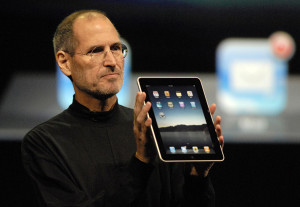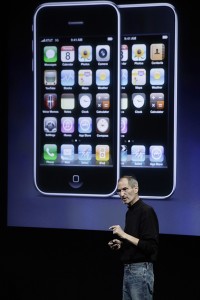
Apple CEO Steve Jobs officially stepped down from the helm on August 24 amidst rising concerns for his health after numerous medical leaves of absence, leading to speculation on the future of Apple Inc.
Jobs, upon resignation, immediately recommended in a letter to Apple’s Board of Directors and the Apple Community that COO Tim Cook should replace him as CEO of the company while asking to take on a new role for himself as Chairman of the Board.
In the same letter, Jobs wrote, “I have always said if there ever came a day when I could no longer meet my duties and expectations as Apple’s CEO, I would be the first to let you know. Unfortunately, that day has come.”
In wake of the announcement, Apple’s stock dove 5 percentage points to $357.10, which, according to the San Jose Mercury News, was a significant but not excessive fall considering prior expectations for Jobs’ resignation.
Jobs, an iconic figure who personified Apple’s phoenix-like rise from near bankruptcy in the late 90s, helped reinvigorate the company through his leadership.
Despite his notable lack of philanthropy in comparison to Bill Gates and sometimes ruthless fighting for patents with other tech companies, Jobs has managed to maintain the goodwill of consumers for himself and Apple.
Will Wilkinson, a blogger for the Economist, gave a simple explanation for this by tweeting, “Class-war fact: Ruthlessly competitive, patent-monopolist, multi-billionaire executives are worth fawning over, if they’ve got design sense.”
Cook, Apple’s new CEO, has big shoes to fill in order to keep up with expectations for creative innovation and maintain investor confidence with continued success of products like the iPhone or iPad.

Apple’s new CEO also serves on the Board of Directors for Nike, potentially increasing the possibility for further cooperation between the companies with more products like Nike + iPod that serve to sync technology with workouts for the average consumer.
However, Apple and Cook must also face tough competition in their newest and biggest markets of mobile handsets from Google Inc., on top of concern over cohesion with their new leadership.
Google recently acquired Motorola Mobility in what many speculate is a move to take over parts of the smart phone market.
Google’s Android open platform mobile software already runs on a number of mobile handsets and the combination may prove troublesome for Apple’s iPhone.
In a statement regarding the acquisition, Google CEO Larry Page maintained, “Our acquisition of Motorola will increase competition by strengthening Google’s patent portfolio, which will enable us to better protect Android from anti-competitive threats from Microsoft, Apple and other companies.”
Regardless of Google’s ultimate intentions, the action is clearly a competitive threat to Apple that the company must address while dealing with the transition of power.
Another issue of concern for Apple’s new CEO will be the retention of researchers who may have been more loyal to Jobs than to the company. Cook will have to work hard in order to ensure continued loyalty of Apple’s employees.
Despite these various concerns, investor confidence in Apple still seems to be high with the company’s stock bouncing back quickly on NASDAQ over the days following Jobs’ resignation.
Apple’s stock is currently trading near six-month highs and briefly overtook Exxon Mobil Corp. in the early stages of August to become the world’s most valuable company after ballooning sales in China, according to an article by Adam Satariano in Bloomberg.
This enormous achievement is part of Jobs’ legacy at Apple and one more reminder of how far the company has come.
Apple Inc. still remains in good position in comparison to its competitors through quick expansion into developing markets with products like the iPhone.
Apple’s transformation seems to have had little impact on company performance as of yet, but not enough time has passed to be able to tell what will happen in the future to the company.
The jury is still out on the new CEO of Apple and it will take some time before his performance can be truly rated.
However, Apple clearly has confidence in Cook, according to a statement made by Art Levinson, Chairman of Genentech, on behalf of Apple’s Board.
“The Board has complete confidence that Tim is the right person to be our next CEO,” he said. “Tim’s 13 years of service to Apple have been marked by outstanding performance, and he has demonstrated remarkable talent and sound judgment in everything he does.”
Continued speculation may be appropriate for Apple, but their confidence in the company’s new direction seems justifiably high.








